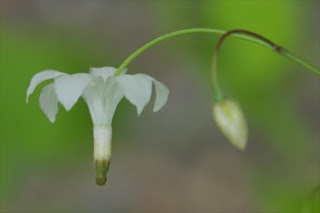Trough building has become very popular in recent years and most gardeners I know have at least a trough or two in their gardens. We are no exception. We have a collection of large and small troughs and have grouped them together into a trough garden. Some of the larger troughs are new this year and we are still in the process of planting them.
Planting a trough is a creative process. Plants selected for grouping in a trough should look good together and also need to have similar cultural requirements. Rock accents can be placed in a variety of ways to create different effects.
We created a crevice garden using broken flagstones in one of our new large troughs. We planted it with Western native plants including small scale Penstemons, Eriogonums, and Drabas.
Another trough uses tufa accent rocks and is planted with silver and dwarf cushion saxifrages. The porous tufa retains moisture and releases it slowly over time, creating an evenly moist root zone for the Saxifrages.
As part of our summer class series, we are holding a class on Alpines and Trough Planting this Saturday, June 25th at 1 pm. If you live in our area and would like to learn more about Alpine plants and trough planting, we invite you to join us.



















